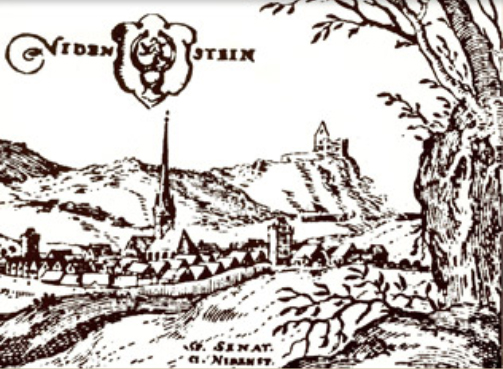“This Jew Amschel is at the head of an important propaganda scheme in favor of the Elector, whose branches extend throughout the former Hessian territories. The suppositions are based on the facts : whenever I enter the Elector’s quarters, I always find Rothschild there and generally in the company of Army Councilor Schminke and War Secretary Knatz and they go into their own rooms and Rothschild generally has papers wih him.”
So it appears that a Knatz was a confidant of William I of Hesse. Whether this Knatz was in exile with William or whether he was a representative of the Prussian government is not known. It would be interesting to learn if this Knatz also originated from the state of Hesse and whether as Secretary of War he was responsible for the sale of Hessian soldiers to the British. If that were the case, he sold another Knatz as a mercernary soldier, Heinrich Knatz from Niedenstein.
For additional information please see the source: The House of Rothschold, Money’s Prophets 1798-1848 by Niall Ferguson.
Did a Knatz find evidence that the German’s were instrumental in the Russian Revolution?
At the end of World War II, files of the German Ministry of Foreigh Affairs came into the hands of the Allies which provided evidence of German involvement in the Russian Revolution. Germany was fighting a war on two fronts in 1914. One way to influence the outcome of that war was to support diruptive forces within Russia. To do this, the German’s turned to Russian revoluntion emigrants and other socialists such as Lenin and Dr. Alexander Helphand, a Russian Jew who had converted to socialism early in life. Helphand used his knowledge of social and economic conditions in various parts of the world to his advantage and he was ultimately recommended to the German Foreign Ministry. Helphand believed that Russian democrats could only achieve their goals with the total distruction of the Tsarist regime. Helphand proposed instigating a series of strikes in Russia that would lead to the downfall of the Tsar. The German’s were interested and provided funding to Helphand while Helphand sought out Lenin for collaboration. The results of their meeting was secret and Lenin denounced the publication of Die Glocke by Helphand. After the Tsar took control of the military, there were waves of unrest as industrial workers went on strike. while the strikes began rooted in economic demands, they increasing took on a political agenda. Helphand had established trading companies that were prospering with astonishing speed. Money was pouring into his pockets and funds were also staying in Russia, from an illicit trade with Russia in medical supplies, contraceptives, pencils and cosmetics. As far a Helphand was concerned his trading activities and his journalism was all serving one purpose- the fall of the Tsarist regime. The connection between the trading activities of Helphand was an auxiliary in achieving the revoutionary unrest in Russia was confirmed by a report of a German auditor who investigated one of the Helphand’s subsidiary trading companies. The auditor Knatz prepared the report on December 7, 1917. According to George Katkov, author of Russian 1917, The February Revolution “The auditor (Knatz) was very surprised at the unbelieveable transaactions carried out by Sklarz in violation of the German wartime trade regulations, but with the knowledge and consent of the German Foreign Ministry. The auditor felt himself duty bound to ask whether such transactions were not condoned in order perhaps to facilitate the achievement of other aims for which Sklarz was being used by the Auswartiges Amt. “(the Federal Foreign Office). Note Sklarz refers to Georg or Heinrich Sklarz, two brothers who worked for the German government and also Helphand).
Reference for the report of the auditor Knatz, see Scharlau and Zeman, A Merchant of Revolution, Oxford University Press, 1965 and in Scharlau in his Oxford doctoral thesis.
